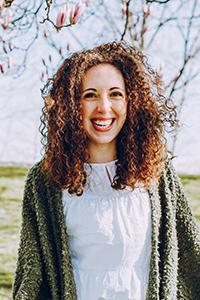Editor's note: This is the first in an occasional series in which people will talk about their jobs in the Catholic health ministry. We invite readers to recommend themselves or colleagues for stories that will show the diversity of jobs, skills and people that make the ministry vibrant. To do so, send an email to jvandewater@chausa.org with "At Work" in the subject line.
By KATHLEEN NELSONTo help people who are homeless, Emily Corey must have two work homes. Corey is the first hospital homeless service coordinator for SSM Health Saint Louis University Hospital, working for and with a provider of services for people who are experiencing homelessness or housing insecurity.
"Health systems need to keep up to date with needs of the community, and I'm glad that SLU hospital is doing so," says Corey.

Following a community needs assessment, SSM Health looked for ways to commit resources to address violence, food insecurity and homelessness. Situated near downtown St. Louis, the hospital's emergency department treated five to seven patients a day with nowhere to go upon discharge. The department's social workers lacked the connections or tools to help them find a place for patients to sleep for a day, a week or a month.
The heightened needs through the pandemic prompted Bryan Walrath, SLU hospital's vice president of operations, to reach out to St. Patrick Center Chief Executive Anthony D'Agostino, who directs the largest provider of services to the homeless in St. Louis. Walrath hoped to build on a pilot program known as Hospital to Housing, which the center started with another health system. It connects patients who frequently visit the emergency department seeking food or shelter with housing, medications and social services with the goal of reducing unnecessary trips to the emergency department for patients not there for direct medical attention.
Though Corey is officially listed as an employee of St. Patrick Center, her position is funded through SSM Health, and she does the bulk of her work at SLU hospital. She graduated in 2020 from Saint Louis University's master of social work program. Though she gained experience as a student working with veterans and survivors of trauma and sexual violence, building this position from the ground up is her first full-time job.
"I like the fact that I literally meet clients where they are and branch out with the resources we are able to provide," she says.
A typical day
Her first duty most days is to check for new or pending referrals of patients who reported housing insecurity or homelessness. She meets with those patients for an intake assessment.
"Being at the hospital, I can respond within a matter of minutes," she says. "When I meet with them, I know very little about them, which is good. I don't have a bias about them. We'll discuss their housing needs and goals, where they've tried to obtain housing before, and what barriers they have encountered."
The initial interview takes about 45 minutes. At that point, she works to coordinate shelter placement, connecting with family or friends, transitional housing or other community services.
"Because I'm an employee of St. Patrick Center and work at SLU hospital, I know the people I'm referring them to," she says. "We make the calls together. I know exactly who can help them with housing or job or behavioral health. People respond better to a word-of-mouth connection, rather than a name on a sheet of paper.
"Working within the constraints of a fractured shelter network in St. Louis, I still find it difficult to find a bed because of limited availability and the procedures to secure one," Corey says. "If I feel frustrated by the barriers but have access to a phone and a professional network, how much more difficult must it be for a person who is experiencing homelessness who is always running into these barriers?"
She also spends time at her second office at St. Patrick Center to review cases with her co-workers and check in with the clients who receive services there.
"One of the most rewarding things has been meeting a patient who might not want to share certain details," she says. "But I love watching the transformation over a period of time, being their first touchpoint, getting them connected and advocating in the medical system for them. I couldn't do that if I worked only within the walls of the hospital."
When she is out of the hospital, she remains in touch with the emergency department, to increase accessibility and to conduct intakes by phone before discharge if necessary. She also maintains a separate phone number for her clients, so they have immediate access to her, rather than a confusing voice-automated system or hotline.
Success leads to expansion
From the time Corey was hired in October through July, the program received 144 referrals; more than 85% of the people referred have accessed community services through St. Patrick Center or another nonprofit for housing, employment, shelter, transitional housing or skilled nursing facility; or are living with a family member. Clients receive services from Corey for three to six months.
The program is expanding and has rebranded as Hospital to Healthy Housing. St. Patrick Center has hired two full-time coordinators to work in parallel positions with BJC Health and Mercy, another ministry member based in St. Louis.
"When you're looking to build a program from the ground up, it's tricky to hire an ideal fit," Walrath says. "Emily has taken ownership and pride in the role. Positions like this and people like Emily can provide tremendous value to hospitals willing to be a little creative."
